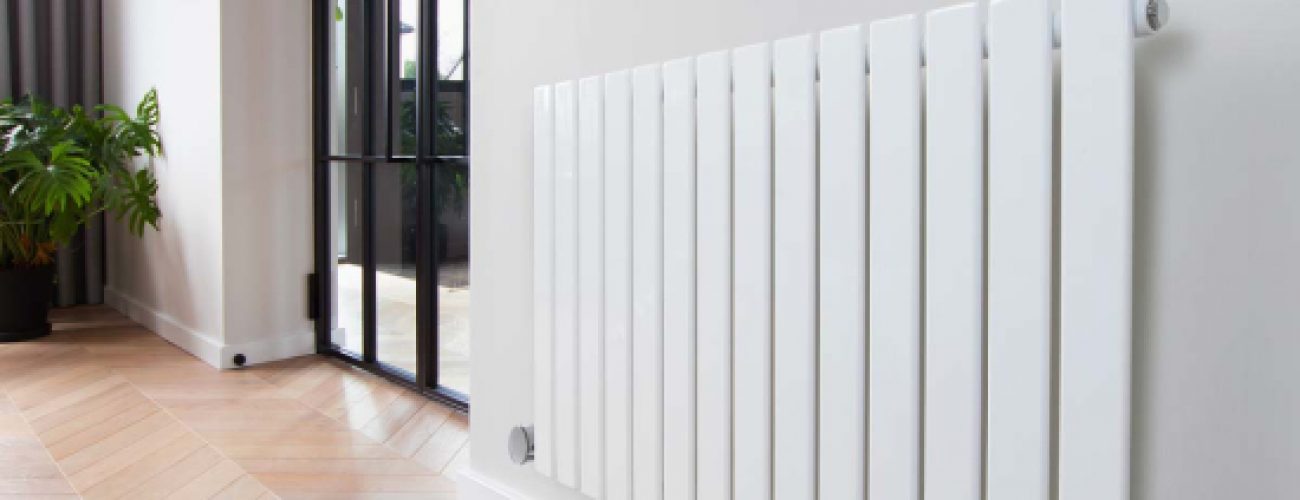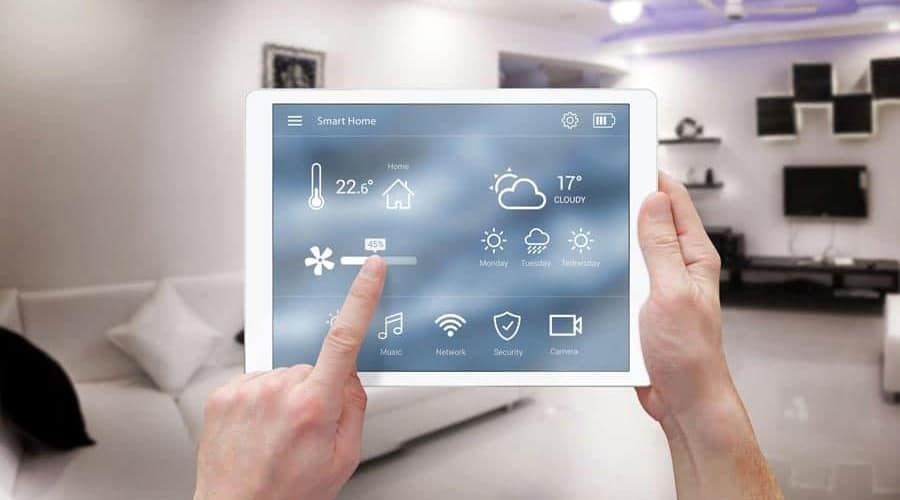The rising popularity of smart products can be attributed to their ability to save energy. Given that heating constitutes a significant portion of energy consumption in numerous households, homeowners stand to gain substantial advantages by incorporating a smart electric heater.
Embracing smart heaters proves to be an effective method for conserving heat energy and reducing energy bills. These heaters efficiently warm up homes and contribute to long-term cost savings. With various smart heaters available in the market, the process of choosing the right one may seem complex. Here’s a comprehensive guide to everything you need to know about smart heaters.

What's on this page?
What Is A Smart Heater?
A contemporary method for managing your heating is through a smart heater, which enables control via a smartphone or a home assistant hub. These heaters leverage Wi-Fi connectivity, offering enhanced functionality compared to standard heaters. Additionally, you can integrate smart heaters with other network sources to enjoy similar advantages.
The latest smart electric heaters provide comprehensive control over various temperature-related aspects of your home. Through app control, you can utilize a diverse range of functional and energy-saving features, enabling you to monitor energy consumption, establish personalized heating schedules, and set operation timers. This high degree of control and user-friendliness makes smart electric heaters well-suited for many households.
A connected heating system goes beyond a simple thermostat, varying in size based on budget considerations. For those starting with home automation heating, compact systems like small wall heaters are a popular choice. Alternatively, larger smart heating systems with radiator mechanisms and intelligent software offer the capability to effectively warm up the entire home while optimizing energy costs.
Features Of A Smart Heater
Many smart heaters are accompanied by a downloadable app accessible on smartphones, tablets, and similar devices, facilitating convenient control and navigation of all smart heating unit settings.
Common features found in smart heaters include:
1. Basic temperature modulation with a slider function
2. Power on and off button for operation
3. Option for optimal temperature settings
4. Display screen indicating the current room temperature
5. Capability to set scenes for specific rooms
6. Intelligent machine learning for customized scheduling
7. Ability to manage multiple heating devices simultaneously
It’s essential to recognize that not every smart heater will incorporate all these functions. To align your purchase with your household’s requirements, carefully review the specifications and select a smart heating device accordingly.
How Do Smart Heaters Work?
Now that you have a grasp of smart electric heaters, it’s crucial to delve into their operational mechanisms for efficient home warming.
Smart electric heaters establish a connection with both your boiler and network simultaneously. This connectivity empowers you to regulate your heating, accessible through a handheld remote control, a dedicated app, or your home assistant hub.
Smart thermostats facilitate control over multi-room heat settings and hot water through various means. Some models incorporate geofencing capabilities and motion sensor technology, discerning room occupancy. This functionality informs the system when to initiate heating, thereby conserving energy by avoiding unnecessary heat consumption.
Many smart electric heaters are equipped with safety features safeguarding your home’s piping from prolonged heat damage. For Wi-Fi electric radiators or smart wall heaters, adherence to proper installation guidelines ensures optimal system efficiency. After installation, you can send signals through your network to dictate the heating system’s operation.
Certain smart wall heaters boast advanced capabilities, including weather tracking and monitoring. These heaters autonomously adjust temperatures based on prevailing weather conditions, ensuring precise and efficient utilization of heat energy.
As mentioned earlier, the ability to set up multi-zone settings with smart heaters allows for tailored heating instructions for each room.
Why Do You Need Smart Heaters?
Visualizing the energy consumption of inefficient heaters can be challenging, especially when content with a standard heating system. However, the assurance of long-term efficiency benefits makes smart electric heaters a compelling choice.
This system excels in four fundamental areas: comfort, efficiency, convenience, and cost-effectiveness. Smart wall heaters grant precise control over heating systems, enabling optimization of energy consumption in ways unattainable with conventional heating systems.
Gaining better control over heating will reflect in reduced energy bills. Even modest initial savings accumulate significantly over time, making smart heaters an appealing option for households.
Despite their smart learning capabilities, most smart products remain user-friendly and easy to install. For more intricate heating systems, additional installation assistance from electricians may be necessary.
Embarking on a smart heating system journey can start with installing a smart wall heater, serving as a foundation for further integration. These smart devices seamlessly replace conventional thermostats in households.
What Are The Benefits Of Smart Heaters?
Apart from the convenience of control, smart heating systems offer numerous advantages and have become an indispensable element of contemporary homes. Here are the key benefits of smart electric heaters.
**Enhanced Comfort**
A significant benefit of smart heaters lies in the elevated comfort they provide, allowing for personalized warmth throughout your household. Addressing individual room heating needs becomes effortless with smart wall heaters. For instance, you can tailor heat settings based on preferences, creating specific temperature levels for various rooms. Adjustments can also be made for different times of the day, such as implementing low-intensity background heating when away and increasing it upon returning home. Smart wall heaters enable instant temperature changes in entire rooms, enhancing comfort during specific activities or times of the day.
Additional devices, such as motion sensors, further complement smart heaters by adjusting room temperature upon entry or reducing it when a room is unoccupied. Window/door sensors can turn off heating when open for extended periods. Moreover, the capability to set up “Scenes” allows coordinated control of various smart devices to achieve the desired room temperature. These settings, saved as scenes on smart heaters, can be easily recalled through the app, according to schedules, or with a single click.
**Improved Functionality**
Smart heaters provide versatile control options, including remote control, app-based control, and compatibility with tablets and voice commands. Some smart wall heaters feature large touchscreen displays for easy access to room temperature settings. Control extends to schedules, sensors, and room activity, eliminating the need for physical intervention. Forgetful about turning off the heating? Smart electric heaters automatically address this issue, contributing to enhanced energy efficiency.
In addition to regulating room temperature, smart heaters also cater to hot water systems. Unlike conventional heaters that heat large water quantities, resulting in excess waste, smart water heater controls enable precise heating according to actual water needs, minimizing energy costs.
**Efficient Energy Saving**
One of the most significant benefits of installing a smart wall heater is improved energy saving. Considering that an average UK household consumes 242 kWh of electricity per month, with heating accounting for a considerable portion, adopting energy-efficient choices is crucial. Smart heaters facilitate energy-efficient decisions by minimizing power usage through smart control. Many smart systems can be programmed to reduce heating levels during peak hours, relying on latent heat energy to warm the house efficiently. Unlike other energy efficiency changes, the transition to a smart heater is relatively cost-effective, providing long-term energy savings once installed.
What Networks Work With Smart Heating?
Incorporating home automation products into your household necessitates a stable network connection, enabling access to the full array of features and benefits offered by your smart devices.
For smart heaters, a robust network connection is essential to harness their energy-efficient capabilities. While most smart heating units are compatible with Wi-Fi, there are alternative methods of connecting your smart device to a network.
**Network Compatibility:**
**1. WiFi:**
WiFi, prevalent in many households, seamlessly integrates with various smart devices, including smart heaters. The majority of household WiFi networks boast ample bandwidth, eliminating the need for network upgrades to accommodate a smart heating system. When you instruct your smartphone app to adjust the heating, it transmits a signal to your home’s wireless connection for execution. The advantages of using WiFi include widespread coverage, reducing connectivity issues with heating controls. However, it’s crucial to note that WiFi devices employ manufacturer-specific communication protocols, making compatibility contingent on the manufacturer. Verify the specifications to ascertain if your smart heater is WiFi-compatible.
**2. Z-Wave:**
Z-Wave operates as a wireless communication network utilizing low-power radio waves to transmit signals through walls, furniture, and floors. Its configuration eliminates the need for additional wiring. This network features two-way communication and mesh networking, providing a reliable network source for smart heaters. However, a drawback of Z-Wave is its limited coverage for larger homes, potentially resulting in connectivity issues.
**3. Zigbee:**
Zigbee, an open standard network protocol employing low power, offers mesh network capabilities for diverse wireless devices. While less common in households, it finds application in larger corporations and office spaces. Unlike Z-Wave, Zigbee is simpler, focusing on controlling specific functions. This simplicity can be a limitation if you seek a single network to manage all aspects of a smart heating system.
What Are The Different Types of Smart Heaters?
Smart electric heaters vary in design, and the market offers several distinct types of these devices. While each heating device presents specific advantages, all smart heating systems share the common capability of sensing environmental conditions and adjusting your heating accordingly. Here are the diverse types of smart heaters available in the market.
Smart Thermostats
Typically, conventional thermostats are employed to observe and ascertain the ambient temperature of a room. They enable manual adjustment of the desired temperature for the space.
In contrast, smart thermostats go beyond simple temperature control. They analyze your home’s heating needs and patterns, autonomously adjusting the temperature. Additionally, these intelligent devices monitor external temperatures, aiding in the efficient regulation of indoor heating. Some smart thermostats even offer scheduling options for optimized heating throughout the household.
Smart Thermostatic Radiator Valves
Within a water-based heating network, thermostatic radiator valves (TRVs) govern the circulation of hot water, dictating when it enters a radiator based on the valve’s preset temperature.
When the ambient temperature falls below the established threshold, the smart TRV opens, allowing water to flow into the radiator. Once the water attains its optimal temperature, the valve closes, halting the water flow.
As the water flow ceases, the radiator begins to cool. Many smart TRVs incorporate sophisticated software to regulate the rate of temperature changes, preventing unnecessary heat energy wastage.
While some smart TRVs offer temperature readings akin to those found in smart wall heaters, the precision of these readings may be somewhat limited.
Smart Electric Radiators
Smart Electric Radiators serve as a comprehensive heating solution, regulating your home’s temperature and providing hot water.
Operated through a Wi-Fi network, these smart radiators eliminate the need for an additional network connection. Some models even include a separate handheld remote control, enhancing the functionality of your heating system.
Control is at your fingertips through a smartphone app or voice commands, enabling you to manage heating settings remotely, even when you’re away from home. Despite their advanced capabilities, smart radiators are user-friendly, allowing you to adjust settings conveniently via your smartphone rather than a traditional control panel.
Next steps
Once you’re prepared, our suppliers can furnish you with quotes, allowing you to compare and find the most competitive prices. Simply complete this brief form to initiate the process.
Get FREE Smart Control Quotes
Find out how much a Smart Control System would cost you
Complete A Short Form – Receive Free Quotes – Compare & Save
Get FREE Smart Control Quotes
Find out how much a Smart Control System would cost you
Complete A Short Form – Receive Free Quotes – Compare & Save







